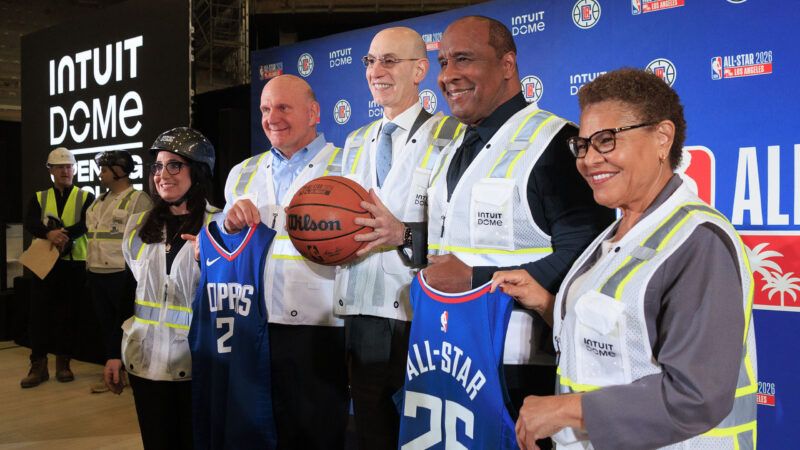California To Bend Last-Call Law for Elite Clippers Fans
If you want to drink alcohol in California after 2 a.m., it helps to be the billionaire owner of the L.A. Clippers.

It's good to be a billionaire. After years of failing to extend the state's "last call" law, it turns out all that was needed to keep the booze flowing past 2 a.m. in California was for the extension to personally and solely benefit one of the richest men in the world.
California currently forbids alcohol from being sold from 2 a.m. to 6 a.m., meaning that bars and nightclubs effectively have to close at 2 a.m. State Sen. Scott Wiener (D–San Francisco) has become famous for his relentlessness in running new last-call extension bills—only to be repeatedly rejected. Wiener started pushing for a change in 2016 and even got one of his bills to clear both houses of the state Legislature in 2018, only to see it vetoed by former Gov. Jerry Brown. When Gov. Gavin Newsom—a former co-owner of the Balboa Cafe club in Marina, California—took office, hope sprang up, but as recently as 2022, a narrow bill that would have extended last call only in San Francisco, Palm Springs, and West Hollywood still died in the Legislature.
It turns out that passing a last-call bill is actually pretty easy—if it benefits the right people. Last week state lawmakers passed a bill extending last call to 4 a.m., and it now heads to Newsom's desk. The only catch? It applies to a single club. While every other bar in the Golden State will continue to be cut off at 2 a.m., a small club inside the Intuit Dome—the new home of the Los Angeles Clippers—will be able to keep the party going until 4 a.m.
According to the Los Angeles Times, members of the Intuit Dome's private luxury suites (which go for north of $10,000 for a single game) will be granted an extra two hours of boozing while the hoi polloi sit in post-game traffic. The club will have a max capacity of only 100 people, meaning that for the 18,000-person-capacity Intuit Dome, this is not a top 1 percenter law—it's a top 0.55 percenter law.
The Clippers are owned by Steve Ballmer, the former CEO of Microsoft and the sixth richest person in the world. Local news outlet KCRA notes that Ballmer hasn't made donations to individual state legislators since 2021. However, Ballmer's wife donated $1 million to Newsom's campaign during his recall challenge in 2021.
The bill's sponsor, Assemblymember Tina McKinnor (D–Inglewood), is claiming that the Intuit Dome's home of Inglewood needs the legislation to ensure "competitiveness." Never mind that the bill definitively makes things less competitive since it gives one 100-person club, inside one stadium, inside one city, the right to stay open two hours later than any other venue.
Rather than focusing solely on the blatant cronyism of this new bill, those opposing it are also fearmongering with visions of a post-apocalyptic world if last call is extended.
One state senator first mentioned the bill being crafted for "an exclusive club" before going on to argue that it would allow people to drink up until 4 a.m. and "then turn them loose" on the Inglewood streets. This echoed former Gov. Brown, who claimed the 2018 bill he vetoed would have created "mischief and mayhem."
Opponents have specifically been focusing on claims that the extension would increase drunk driving accidents, an argument made by police unions in opposing prior last-call extensions in the state and which is being recycled this time around. Retired California Highway Patrol Sergeant and Assemblyman Tom Lackey (R–Palmdale) warned: "Allowing the Intuit Dome to extend alcohol sales until 4 a.m. sets a dangerous precedent for the entire state. The data is clear: extending last call leads to more drunk driving incidents, more accidents, and more lives lost."
However, the data is demonstrably not clear and is actually quite murky. New York City has a 4 a.m. last call and lower DUI rates than Los Angeles, San Diego, San Jose, or San Francisco. Chicago also has a special license that allows certain bars to stay open to 4 a.m. or 5 a.m and likewise has lower DUI levels than Los Angeles. Overall, L.A. is the third worst city in America for drunk driving (New York and Chicago are in the 40s). In fact, eight of the top 10 worst drunk driving cities in America are in California with its current 2 a.m. last-call law. At the state level, there is also no discernible correlation between a state's last-call time and its drunk driving rate.
In a perfect embodiment of what modern politics has become, one side is busy giving handouts to the sixth richest man in the world, while the other predicts the apocalypse if bars stay open two hours later.


Show Comments (60)